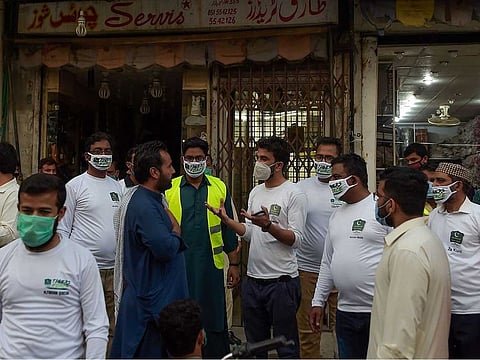Pakistan’s first COVID-19 testing kit approved
Diagnostic kits developed by scientists get approval after successful test

Islamabad: The continuous increase in the number of coronavirus positive cases coupled with the dwindling medical resources have pushed the development of domestically produced testing kits to boost Pakistan’s fight against the pandemic.
The National University of Sciences & Technology (NUST) has received the much-awaited approval from the Drug Regulatory Authority of Pakistan (DRAP) after the successful lab trials of the coronavirus testing kit, N-CovKit, federal minister for science and technology, Fawad Chaudhry, confirmed on Friday.
More tests at less cost
Congratulating the scientists, the minister said the testing kits developed by NUST “will bring significant cost reduction of COVID tests,” in the country and will “save huge import bill.” The indigenously developed kits would soon be available at a lower price as compared to imported ones, according to the official statement.
The young scientists behind the achievement are Associate Professor Dr. Aneela Javed and Assistant Professor Dr. Ali Zohaib of the NUST Atta-ur-Rahman School of Applied Biosciences (ASAB). The two have been working on the diagnostic kit since the pandemic hit the country and announced the development in mid-March.
“Big achievement”
“It’s a big achievement for Pakistani scientists and researchers. Now that the diagnostic testing kit has been approved by the DRAP, we hope it will soon be available in the market,” said Dr Aneela while talking to Gulf News. The long list of required procedures and testing by different companies and health regulators is delaying the immediate availability. The kits will go into mass production by a leading pharmaceutical company as soon as the DRAP gives the nod for commercial production.
Initially, the NUST team collaborated with Wuhan Institute of Virology China, DZIF Germany, Columbia University USA and the Armed Forces Institute of Pathology (AFIP) Rawalpindi while researching. The scientists appreciated the support from the National Institute of Health (NIH) during the process. ASAB Principal Dr Hussnain Janjua says the test kits developed at NUST have unlocked the potential of local universities to contribute in national development. However, translating research into meaningful impact requires government grants and support from foundations.
Local kits to help increase testing capacity
The locally developed test kits would significantly increase the testing capacity that has been termed as crucial to track infected people and contain the virus.
Pakistan reported 6,397 COVID-19 cases and 107 deaths during the past 24 hours, taking the national tally to 125,933 and fatalities to 2,463. The highest number of 28,344 COVID tests was conducted on June 11.
Pakistan now has the capacity to conduct 1.2 million tests in a month, said Prime Minister Imran Khan a day earlier. He also shared that the capacity of ventilators in the country has been increased from 2,800 to 4,800 while 1,400 more have been ordered as the health system struggles to cope with the pandemic.







